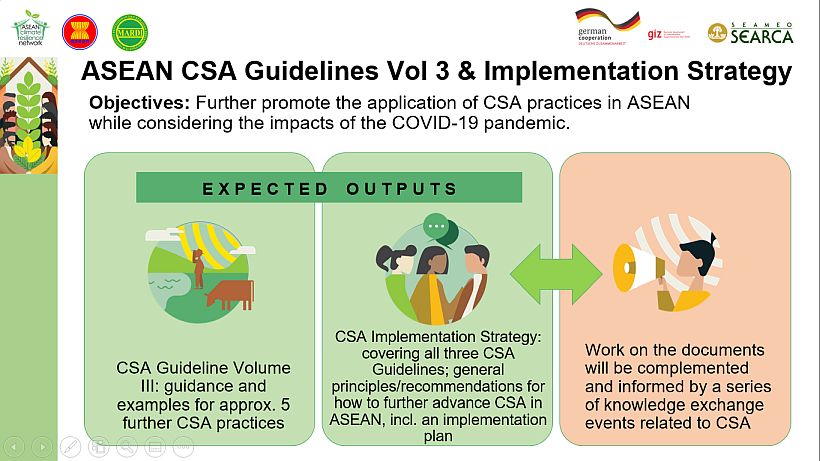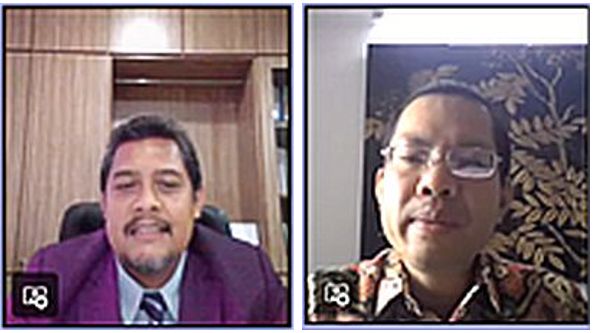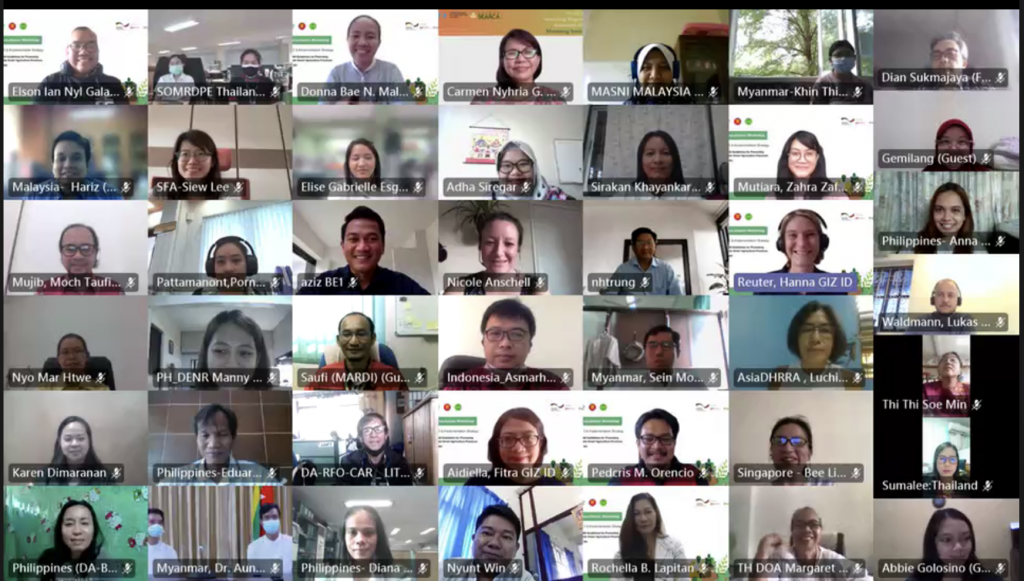ASEAN and its Member States have realised the importance of Climate Smart Agriculture (CSA) practices in relation to climate change and food security. It has been reflected in various regional policy frameworks and tools, among them the ASEAN Guidelines for Promoting CSA Practices Volume 1 and 2. These serve as a reference for policy-makers and practitioners in the region when developing and implementing national policies and programmes on CSA.
To provide updated information and continue the promotion of CSA application in the region, the ASEAN Climate Resilience Network (ASEAN-CRN) organised the first virtual consultation workshop for developing a third volume and an Implementation Strategy for the ASEAN CSA Guidelines on 7 July 2021. The workshop was hosted by the Malaysian Agricultural Research and Development Institute (MARDI).
Building on the existing Volumes 1 and 2, the third volume will cover more CSA strategies and practices, while reflecting on the latest CSA trends and considering the impacts of the COVID-19 pandemic. The new Implementation Strategy will complement all three volumes of the Guidelines and provide overarching recommendations and principles for policymakers to further promote CSA implementation in the region. These documents will contribute to support the implementation of the ASEAN Comprehensive Recovery Framework (ACRF).

The process for developing the Volume 3 and the Implementation Strategy is designed in an inclusive and cross-sectoral manner, integrating experience and expertise from different policy fields and sectors including agriculture, fisheries, forestry, environment and rural development. The first consultation workshop brought together some 75 participants from different ASEAN sectoral bodies, government agencies and development organisations.
During the workshop, participants discussed the experiences with the previous volumes based on recommendations provided in the report ASEAN Guidance for Climate-Smart Land Use Practices – a Review and their implications for the development process for Volume 3. They also reflected on current CSA approaches that are being applied in the region.
In the four group discussions, participants discussed pre-identified implementation strategies including the analysis of hindering and facilitating factors to promote and operationalise CSA practices in their respective countries. All groups recognised the existing CSA guidelines have contributed to the three CSA pillars. These are increasing productivity and income, enhancing resilience and ecosystems, and reducing greenhouse emissions. Moreover, participants shared common insights on the importance of assessment indicators, context-specific CSA practices and system-level approach to CSA in addressing and complementing issues caused by evolving shocks and stresses across food systems including the pandemic.

Way Forward
After circulating the documentation of the first consultation workshop, the next step in drafting the CSA Guideline Volume 3 and the Implementation Strategy will be continuing the desk review, data collection and validation process with stakeholders from the ASEAN Member States (AMS). The draft outline will then be circulated to the AMS via relevant ASEAN sectoral bodies for review and feedback. The second consultation workshop will be held in September 2021. The documents will finally be approved by the ASEAN-CRN and ATWGARD and submitted to the ASEAN Ministers of Agriculture and Forestry (AMAF) for endorsement.
The process will be supported by the Climate Smart Land Use (CSLU) in ASEAN project, financed by the German Federal Ministry for Economic Cooperation and Development (BMZ) and implemented by the Deutsche Gesellschaft für Internationale Zusammenarbeit (GIZ), with contributions from the Southeast Asian Regional Center for Graduate Study and Research in Agriculture (SEARCA).

Brief Overview of the CSA Guidelines Vol 1 and 2
ASEAN-CRN and partners in close coordination with the ASEAN Technical Working Group of Agriculture and Research Development (ATWGARD) have contributed to the development of the previous CSA Guidelines. The CSA Guidelines Volume 1 and 2 received official endorsement from the AMAF in 2015 and 2017.
The guidelines are available for download at Relevant ASEAN Guidelines on Land Use.
| Volume 1: Endorsed by the 37th AMAF 10 September 2015, Makati City, Philippines | Volume 2: Endorsed by the 39th AMAF 28 September 2017, Chiang Mai, Thailand |
| CSA practices covered: – Stress tolerant maize varieties – Stress tolerant rice varieties – Agro insurance using weather indices – Alternate wetting & drying – Cropping calendar for rice and maize | CSA practices covered: – Agricultural insurance – Integrated farming systems – Climate information services – Rice shrimp farming |
Documentation and a recording of the meeting is available :
Event Documentation Consultation Workshop ASEAN Guidelines for Promoting CSA Practices Volume 3
